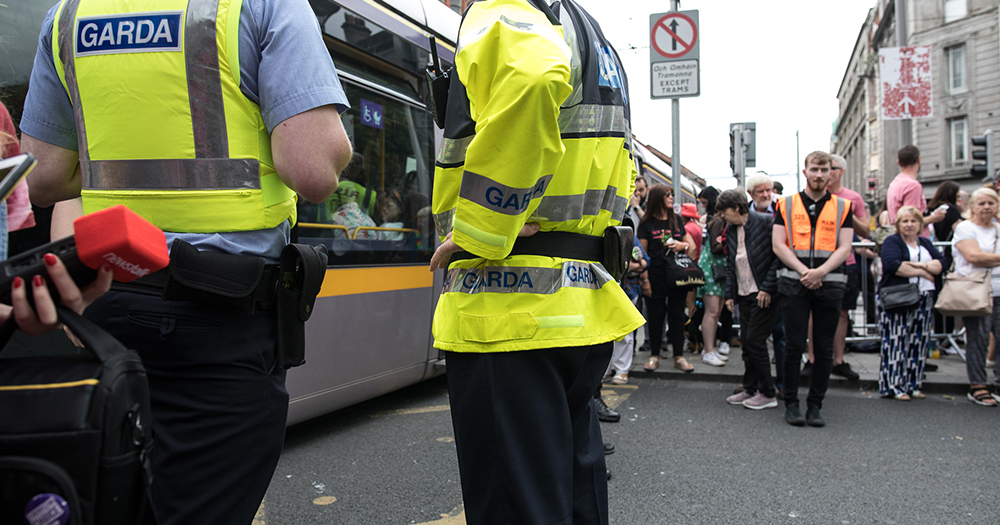As part of the gardaí diversity and integration strategy, which launched today, October 10, they have introduced a working hate crime definition.
Garda Commissioner Drew Harris said the definition would guide gardaí who are investigating hate crimes.
“It’s an important day for us and an important day in terms of protecting the vulnerable in society and that we’re here for everyone in society in Ireland, and we’re here to protect them,” he said.
“The issue about hate crime is that it is based on a prejudice-related motive and prejudice related hatred and that has a very disproportionate impact on the victim of hate crime because it feels very personal to them.
“So we want to be sure that we enhance our service to the victims of hate crime and a way of doing that is making sure we are clear about the incidents that are reported to us and that we have a response in terms of the investigation and the supervision of that investigation, towards identifying perpetrators and obviously bringing them to justice.”
Well done An Garda Síochána for adopting a working definition of hate crime. The GRA encourages anybody who feels they have been a victim to report it to Gardaí. https://t.co/gIcbXuElL6
— GRA (@gardarep) October 9, 2019
The strategy defines a hate crime as:
“Any criminal offence which is perceived by the victim or any other person to, in whole or in part, be motivated by hostility or prejudice, based on actual or perceived age, disability, race, colour, nationality, ethnicity, religion, sexual orientation or gender.”
At the launch, Commissioner Harris spoke about the probable under-reporting of such crimes, saying that people can be the victims of “low-grade incidents” such as name-calling on the street.
To drive response from gardaí, Harris said he wants to get a better idea of the level of hate crime that exists in Ireland.
“We know there’s under-reporting we want to encourage reporting, we don’t want victims to be asking ‘is this a crime or is it not a crime?’. If this often happens and you feel uncomfortable with it, you feel threatened, you should report it to An Garda Síochána.”
Harris added that there should be a legislative basis for dealing with hate crimes, and he expects proposals will be brought forward by the government.
Minister of State for Justice David Staunton commented that the Department of Justice is currently reviewing the Prohibition of Incitement to Hatred Act 1989 which will determine what amendments are required to ensure it is fit for purpose.
“A public consultation on the Act is due to commence shortly. The department is also undertaking research into hate crime, to learn from the experiences of other jurisdictions who have taken different legislative approaches. The results of this research will help develop new approaches to ensure hate crime is addressed effectively in Ireland,” he said.
The National LGBT Federation has welcomed the news saying:
“Hate Crime was identified as the number one issue for the LGBT+ community in our ‘Burning Issues 2‘ research; therefore, this move from [An Garda Síochána] is very welcome progress.
“Hate Crime legislation is also necessary and is a priority for the NXF.”
Dr Jennifer Schweppe and Dr Amanda Haynes, Hate and Hostility Research Group, University of Limerick stated that although this is a positive step, the lack of LGBT+ liason officers will present issues in the plan’s implementation:
“We are delighted to see the publication of the long-overdue Garda Diversity and Inclusion Strategy. The inclusive definitions of hate crime and hate incidents mean that homophobic and transphobic crimes against the LGBT+ community can be recorded as such if the victim or any other person believes the crime to be motivated against their sexual orientation, gender identity, or gender expression.
“There remains, however, no specific recording category for biphobic crimes. We are pleased to see commitments to developing guidelines and policy to support the operation of this new definition, but concerned, however, that there is no commitment to training to bed down a shared understanding of definitions and policy. Of equal concern is the fact that there is no mention of LGBT liaison officers, or diversity officers in the plan. This, we believe, represents a considerable obstacle to the fulfillment of the objectives of the plan.”
© 2019 GCN (Gay Community News). All rights reserved.
Support GCN
GCN is a free, vital resource for Ireland’s LGBTQ+ community since 1988.
GCN is a trading name of National LGBT Federation CLG, a registered charity - Charity Number: 20034580.
GCN relies on the generous support of the community and allies to sustain the crucial work that we do. Producing GCN is costly, and, in an industry which has been hugely impacted by rising costs, we need your support to help sustain and grow this vital resource.
Supporting GCN for as little as €1.99 per month will help us continue our work as Ireland’s free, independent LGBTQ+ media.




comments. Please sign in to comment.